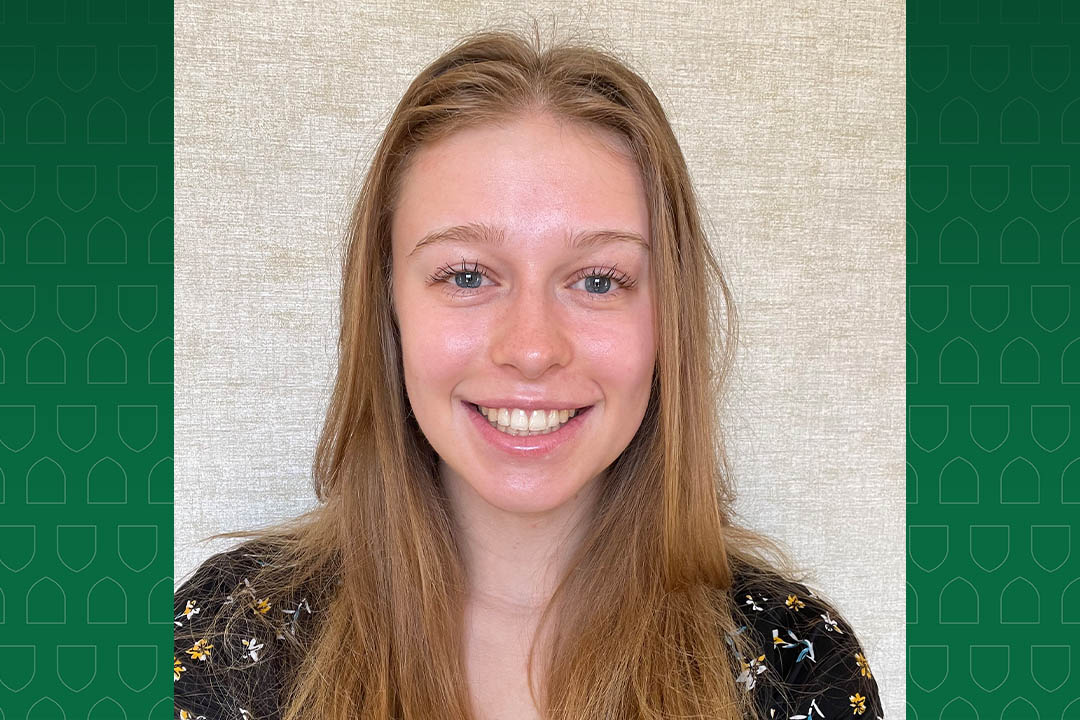
USask Convocation: 'Everyone has their own path in university'
Emjay Koller was named top undergraduate student in the College of Arts and Science, chemistry, at USask.
By Kristen McEwenLike many people attending university for the first time, University of Saskatchewan (USask) student Emjay Koller wasn’t sure what she wanted to do—until she took a chemistry class.
“It was when I took organic chemistry, that I was like, ‘Absolutely, it’s what I want to be doing with my life,’” she said.
Throughout her experience at USask, Koller excelled in her chosen major. She will graduate at the 2025 USask Spring Convocation with a Bachelor of Science Honours Degree with High Honours in Chemistry. She will also be recognized as the Most Outstanding Graduate in Chemistry and will receive the Earl of Bessborough Prize in Science and the Haslam Medal.
“I was pretty surprised,” Koller said. “I was very appreciative. It’s hard to compare myself with other people ... There’s so many people that do a lot of great things.
“It was very motivating for me—for all of my hard work, to see that it was being appreciated,” she added.
The Earl of Bessborough Prize was donated by the Right Honourable Earl of Bessborough to commemorate his father, the former Governor-General of Canada. It is awarded annually at spring convocation to the most distinguished graduate in the sciences.
The Haslam Medal is named in honour of the late Dr. R.N.H. Haslam, former professor of physics, dean of the College of Arts and Science, and vice-president (academic) at USask. The award is presented to the most academically distinguished graduate receiving a four-year or honours degree or certificate from the College of Arts and Science.
Growing up in Saskatoon, Koller noted she always enjoyed solving problems.
“I like something that challenges me a bit, and I think chemistry really offers that,” she said. “It’s also pretty diverse of a field, I’d say. There’s kind of a little bit of a whole bunch of different things.”
Koller added that chemistry utilizes skills such as math, problem solving, and pattern recognition.
“There’s different aspects (to) it,” she said. “That way you’re not going to be bored of it.”
Soon after deciding to focus on chemistry, Koller inquired about summer research positions with a professor. The chemistry department faculty and fellow students helped encourage Koller to decide on her path forward.
“I think that really propelled me into continuing with that path for the rest of my academic career—just having the hands-on experience,” she said.
“I love doing lab work and (being) able to experience that and see how much I resonate with doing that kind of thing,” she added. “That’s what kind of made me choose chemistry.”
As she progressed through her classes, the course content progressively became more challenging.
“I found it a bit harder to balance personal and academic life,” Koller said.
“I kind of took a step back and started actually planning my time and actually dedicating time to doing activities for myself. That really helped me in the future help deal with things like burnout and struggling to keep being motivated,” she added.
Finding balance between focusing on her studies and personal downtime was one of the key lessons Koller learned while at USask.
Koller volunteered some of her time as a peer mentor in the College of Arts and Science. Peer mentors are upper third- and fourth year of study to help first-year students develop academic and learning skills such as note-taking, study skills, exam preparation and making connections. They also help new students navigate university life during their first year.
“That really showed me that I like teaching a lot,” she said. “I think getting to do that experience and getting to work with students, and seeing how much I like getting to hear their questions, and appreciate the help. I think that also guided me a bit towards the future.”
After graduation, Koller plans to attend the University of Alberta in the fall to pursue her doctorate in chemistry. She hopes to one day become a chemistry professor.
For students on their own post-secondary education journeys, Koller emphasized the importance of making time for both academic and personal interests—maintaining mental and physical health.
“University is challenging, it’s a lot of work,” she said. “So, it’s important that you’re fit—capable of doing what’s required of you.”
Koller added that students may have different university experiences compared to what they expected. This might look like taking fewer classes a semester or taking classes during spring and summer terms, she said.
“Everyone has their own path in university,” Koller said. “For me, it was chemistry—and for me it was doing my degree in four years.
“I have friends, and I know people, who’ve done six plus years for a degree. I know people who did it in less time,” she added. “Don’t try and compare yourself to others and stick along your own path—and do what makes sense for you.”
Together we will support and inspire students to succeed. We invite you to join by supporting current and future students' needs at USask.

